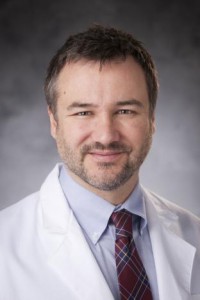 This week’s faculty spotlight shines on James M. Davis, MD, who joined the Division earlier this year.
This week’s faculty spotlight shines on James M. Davis, MD, who joined the Division earlier this year.
When did you join the Division of General Internal Medicine?
I just started at Duke and at the Division of Internal Medicine on April 1st of this year. I spent the last 10 years at the University of Wisconsin; I was at Berkley and the Mayo Clinic before that.
What does your work here at Duke entail?
I have three jobs here. The first is that I’m starting a smoking cessation program for Duke University. The program will be funded through Duke Cancer Institute. We plan to provide services to cancer patients who smoke but also to patients across Duke Medical Center.
My second job is that I’m Medical Director for Duke Center for Smoking Cessation. In this position, I hope to serve as PI on several studies and help to support the work of other PIs. I work closely with Dr. Jed Rose and Joe McClernon, senior researchers here at Duke who provided support and encouragement in bringing me here. My main area of research is the effect of mindfulness training on smoking behavior and smoking relapse predictors.
Finally, I spend about 25% of my time as a hospitalist at Durham Regional Hospital. I’ve worked as a hospitalist for 15 years now – at several great institutions and the hospitalist group here at Duke is one of the brightest, most dynamic groups I have seen. I’ve only been here for a month, but it’s easy to see that the hospitalist team is a well-run ship.
How have tobacco cessation efforts changed since you began studying the field?
Tobacco dependence treatment is a different world than it used to be. Even just 10 years ago there were people who didn’t really believe that smoking was bad for them. Today the word is out about smoking and the great majority of long-term smokers want to quit.
What this means is that most of the smokers that can quit smoking, have already quit. Today, as clinicians, we’re working with a much more dependent and recalcitrant population. Therapies that once worked for most smokers–like giving a patient a medication, a flyer, and some encouragement–most often don’t work any more.
There is evidence now that an integrated approach combining highly effective evidence-based behavioral therapies, individualized medications, and long-term follow up works even for highly dependent smokers. We are now putting together a program at Duke that will offer our patents this kind of treatment.
Can you tell me about your work with tobacco cessation here at Duke?
When I’m confronted with a smoker who has been smoking for 20 years, developed cancer, COPD or coronary disease, they have often already tried to quit more than a dozen times and continue to relapse. They have tried a number of medications and are frustrated. What can I offer this person that will make a difference?
For the last 10 years I’ve been working to answer this question. I’ve been conducting research on interventions that integrate intensive behavioral therapy with pharmacotherapy. The most recent iteration uses mindfulness training, cognitive behavioral training, group support, individualized combination pharmacotherapy, and long-term follow up.
There is a lot to talk about regarding the new smoking cessation program at Duke – it take some time to develop, but but eventually it should provide highly effective intensive therapies as well as less intensive therapies and a remote treatment program for patients who don’t live here.
